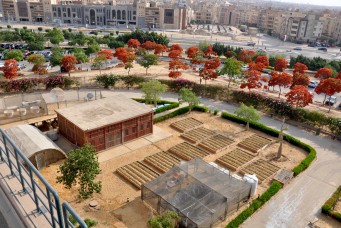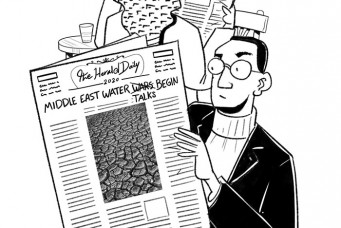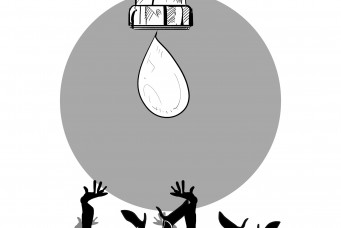The Most Severe Threat Facing MENA
Water scarcity is one of the most pressing issues facing the international community today and has gained widespread attention recently due to the rise in global temperatures and the increase in water consumption in a number of countries, especially those in the Middle East. Despite these concerns, many nations remain unprepared to confront water scarcity and continue to fail to make the issue a political priority.
The shortage of water in the Middle East has worsened in the modern era due to high population growth rates, urbanization and the expansion of cities, the low price of water, and inefficient water management. These factors have created an unstable—and extremely dangerous—situation, which will impact the availability of water and risk exacerbating tensions between countries in the region.
The UN Intergovernmental Panel on Climate Change has predicted that the Middle East and North Africa (MENA) will be among the regions most impacted by global warming in the twenty-first century through a heightened risk of drought and flood, which will reduce agricultural productivity, impact food stocks, and harm the most disadvantaged of the population.
About 5 percent of the world’s population lives in the MENA region, which contains only 1 percent of the world’s renewable fresh water. Water was available to citizens at an annual rate of 819.8 cubic meters per capita as recently as a few years ago, which is more than 25 percent less than the global average. Meanwhile, 60 percent of the region’s population lives in areas suffering from surface water shortages, while the global average stands at about 35 percent. Despite the region’s scarcity of water, MENA has the world’s lowest water tariffs and the highest percentage of GDP spent on water subsidies. This has led to irrational use of water resources and over-pumping of nonrenewable groundwater. These are striking examples of both poor water management and the region’s lack of appreciation of the urgency of this issue.
Groundwater, large transboundary rivers, and desalination represent the main sources of water in the region, according to a report from the World Bank. These sources are all either points of dispute between countries in the region, threatened by excessive use, or too costly to develop. As a result, the countries of the Middle East continue to suffer from an acute lack of water security, which is defined as “the availability of an acceptable quantity and quality of water for health, livelihoods, ecosystems and production, coupled with an acceptable level of water-related risks to people, environments and economies.” In other words, achieving water security is not limited to maintaining high water reserves, but also involves taking into account productive and preventive initiatives to deal with water needs and related issues. Countries that underestimate the importance of water security are squandering opportunities for economic, political, and social prosperity for their citizens.
This is because water security is directly linked to food security, energy, and irrigation inefficiency. The lack of available water impacts agricultural land and leads to an excessive dependence on food imports to meet the demands of the population. The countries of the Arab World import between 30 and 35 percent of their food resources. Egypt and China are among the largest importers of wheat in the world, despite the fact that China’s population is ten times larger. The higher the national dependence on basic food imports, the greater the risk associated with turmoil in global markets. In this way, protecting national security and achieving stability becomes difficult if water and food security needs are not addressed.
This is not exaggeration or fear mongering, but rather a warning about one of the most severe threats facing the MENA region—I do not rule out the possibility of this becoming a cause or justification for conflict—and a call for leaders to change policies. Policymakers can reach a solution to this crisis if there is political will.
For example, irrigation efficiency in the MENA region hovers at 50 percent, but if efficiency was raised to 70 percent through changes to policies and practices, huge benefits could be achieved. These include providing fifty billion cubic meters of water to the Middle East annually, which would allow countries to significantly increase grain production and work to find more sustainable ways to conserve water and produce food.
Water scarcity is a possible precursor to regional and potentially international conflict, and preemptive action must be taken to prevent this. Egypt, Ethiopia, and Sudan have been embroiled in a dispute related to water security and are striving to reach a consensual agreement in this regard that is both sustainable and implementable. The Nile River provides Egypt with 75 percent of its water needs, which are set to increase given population growth rates, and issues related to water security in the country are set to worsen. Ethiopia will soon begin the process of filling a lake connected to the Renaissance Dam, which is part of the largest hydroelectric power station in Africa. Egyptian anxiety and frustration at the slow pace of negotiations and the failure of talks thus far are made clear in Egypt’s public statements and talk about “red lines,” as well as in its seeking to call an international mediator to help resolve the dispute.
Another potential regional conflict lies in water disputes between Palestine and Israel, even if the political conflict is resolved, which remains unlikely. Israel controls the head of the Jordan River, which restricts access to water for Palestinians, and aquifers are also under the control of the Israeli government. This leaves Palestinians with a limited amount of water. United Nations Development Programme reports indicate that Palestinians have access to about three hundred million cubic meters of water annually, while Israelis enjoy about two thousand million cubic meters. Such a disproportionate and inequitable allocation of water resources sows the seeds of future conflict.
A sensitive and potentially dangerous issue like water insecurity in the MENA region requires sincere analysis and an honest warning about its possible impacts. If politicians, scientists, and economists work together to address water insecurity rather than ignoring the issue, we can prevent possible conflict over access to water in the region.
Translated by Madeleine Hall





